When it comes to oils and sauces, it’s easy to not think about the ingredients and nutrition facts, as you’re likely more focused on the food itself. However, this information is just as important. Today, I’ll will be reviewing various Nutiva products and giving my honest opinion on whether or not I think they should be a staple in your kitchen.
Nutiva Organic Virgin Coconut Oil
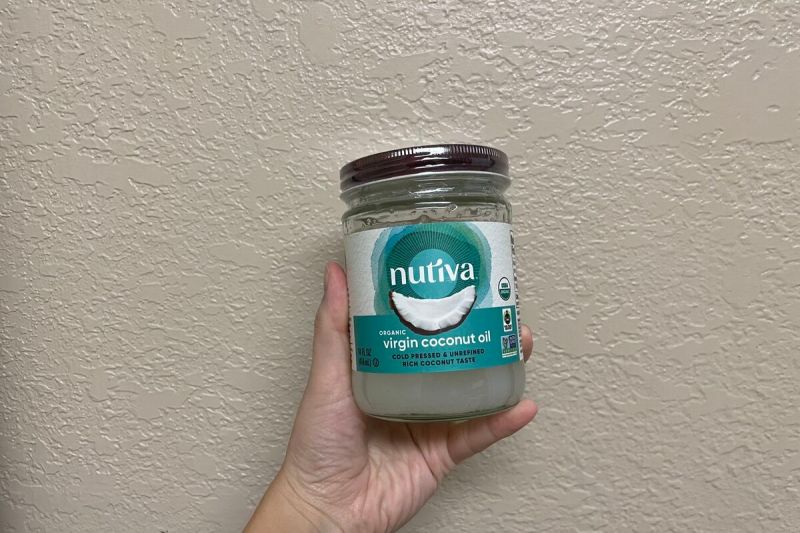
Nutiva coconut oil can be a great healthy alternative to other oils. It can typically be used at higher heats, and it makes a tasty addition to many meals.
Ingredients
- Organic unrefined cold-pressed virgin coconut oil
Important nutrition facts
Serving size: 1 tbsp
Calories: 120
Total fat: 14 g
Cholesterol: 0 mg
Sodium: 0 mg
Total carbohydrates: 0 g
Protein: 0 g
Should you buy it?
I would recommend this product because it doesn’t have any added sugars. While it is high in fat, coconut oil is a great source of healthy fats that promote brain and heart health and healthy hormone levels.
Nutiva Organic Avocado Oil
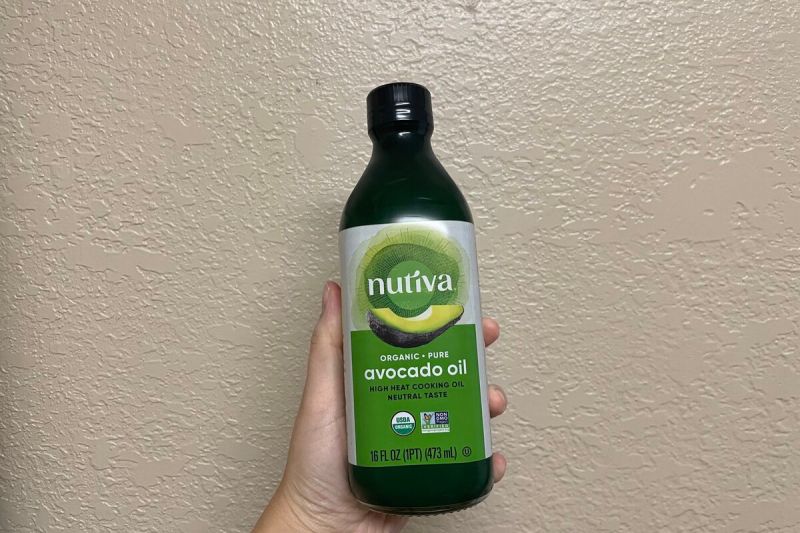
Similar to coconut oil, avocado oil is a healthier oil option, whether you’ll be using it for cooking or mixing into a dish. Avocado oil has a neutral taste and can stand a high smoke point of 500 degrees Fahrenheit.
Ingredients
- Organic steam refined avocado oil
Important nutrition facts
Serving size: 1 tbsp
Calories: 120
Total fat: 14 g
Cholesterol: 0 mg
Sodium: 0 mg
Total carbohydrates: 0 g
Protein: 0 g
Should you buy it?
I would recommend you purchase this product. It’s organically sourced and is a great option for grilling, roasting, sautéing, and even adding to salads.
Nutiva Organic Almond Coconut Spread
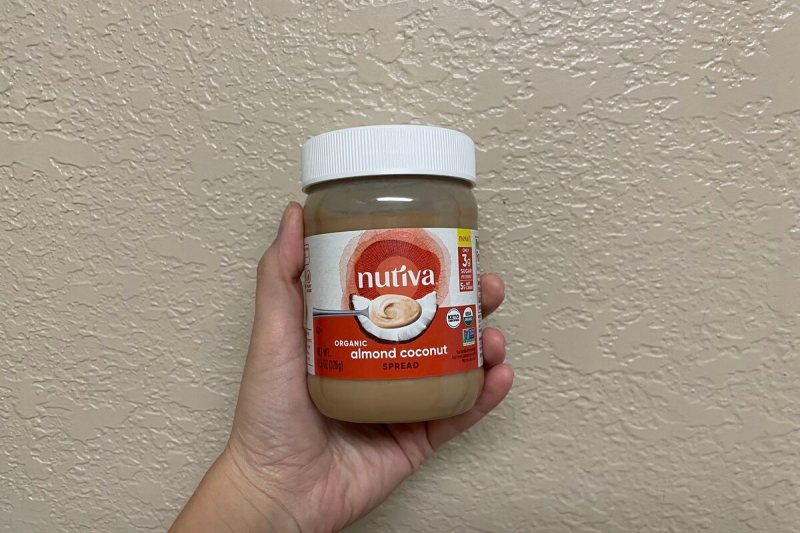
If you’re looking for an alternative to your typical nut butters, this spread may be a tasty choice. It’s vegan, plant based, and gluten free, making it an option for a wide range of people.
Ingredients
- Organic dried coconut
- Organic palm oil
- Organic roasted almonds
- Organic coconut flour
- Organic tapioca flour
- Organic cane sugar
- Organic coconut milk powder (organic coconut milk, organic tapioca maltodextrin)
- Organic high oleic sunflower oil
- Organic sunflower lecithin
- Sea salt
- Organic vanilla extract
Important nutrition facts
Serving size: 2 tbsp
Calories: 210
Total fat: 19 g
Cholesterol: 0 mg
Sodium: 35 mg
Total carbohydrates: 9 g
Dietary fiber: 4 g
Total sugars: 3 g
Protein: 2 g
Should you buy it?
With this product, it’s really up to you. The second ingredient is palm oil, and there has been plenty of debate about how ethical its extraction is considering the impact on the environment. Beyond that, all-organic ingredients have been used to make this spread, and there is less added sugar than in other similar products.
Coconut Secret Organic Coconut Aminos
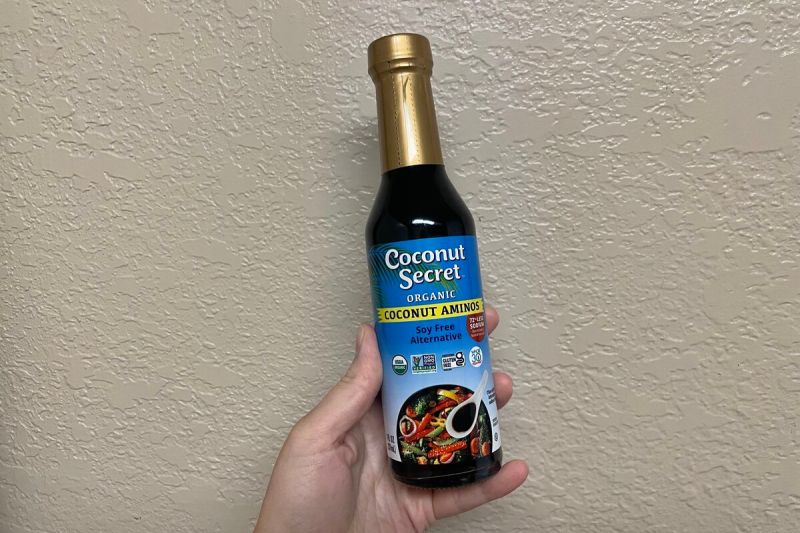
Coconut aminos are an alternative to soy sauce that you can add to various dishes, whether you are stir-frying, dipping, or marinating.
Ingredients
- Organic coconut tree sap
- Sea salt
Important nutrition facts
Serving size: 1 tbsp
Calories: 15
Total fat: 0 g
Cholesterol: 0 mg
Sodium: 270 mg
Total carbohydrates: 4 g
Dietary fiber: 0 g
Total sugar: 3 g
Protein: 0 g
Should you buy it?
I would recommend this product because of how it can replace soy sauce, and it contains 72% less sodium!
Coconut Secret Organic Spicy Coconut Aminos
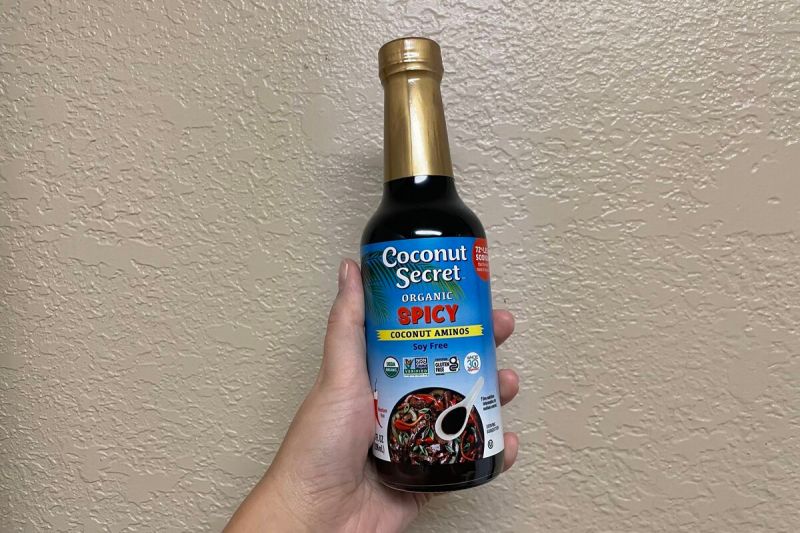
If you need your coconut aminos to have a little kick, this flavor is the way to go!
Ingredients
- Organic coconut tree sap
- Sea salt
- Organic smoked paprika powder
- Organic ginger powder
- Organic garlic powder
- Organic scorpion chili powder
Important nutrition facts
Serving size: 1 tbsp
Calories: 15
Total fat: 0 g
Cholesterol: 0 mg
Sodium: 270 mg
Total carbohydrates: 4 g
Dietary fiber: 0 g
Total sugars: 3 g
Protein: 0 g
Should you buy it?
I would recommend this coconut aminos product as well because it has so few calories, less sodium than others, and can make flavoring your dishes that much easier by eliminating the need for some spices.
Coconut Secret Organic Garlic Sauce & Marinade
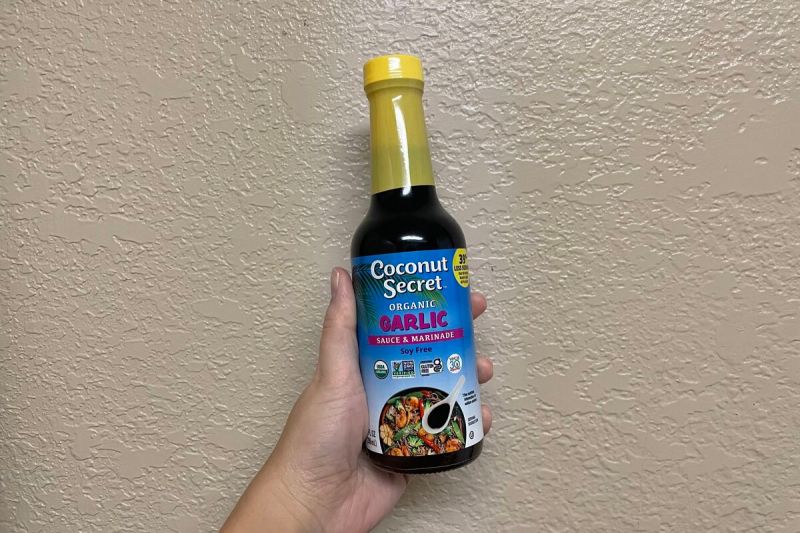
This garlic stir fry sauce could pair nicely with almost any combination of meat, veggies, and noodles.
Ingredients
- Organic coconut tree sap
- Sea salt
- Organic garlic powder
- Organic ginger powder
- Organic cayenne pepper
Important nutrition facts
Serving size: 1 tbsp
Calories: 15
Total fat: 0 g
Cholesterol: 0 mg
Sodium: 300 mg
Total carbohydrates: 4 g
Dietary fiber: 0 g
Total sugars: 3 g
Protein: 0 g
Should you buy it?
Overall, this sauce is a good option because it’s so low in calories. It’s important to note that just one tablespoon contains 13% of your daily sodium intake, so be careful with measurements!
Coconut Secret Organic Teriyaki Sauce & Marinade
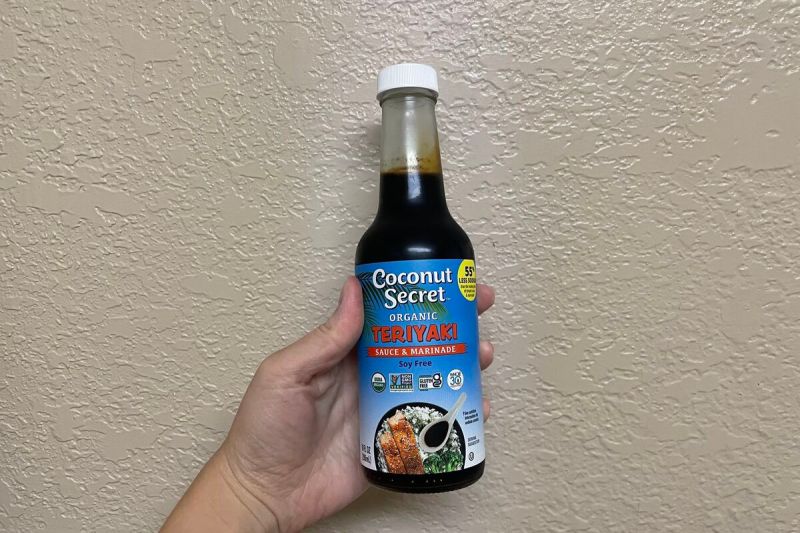
Teriyaki is another tasty flavor that this brand offers, and it pairs especially well with rice, salmon, and broccoli — or any of your favorite veggies.
Ingredients
- Organic coconut tree sap
- Sea salt
- Organic ginger powder
- Organic onion powder
- Organic garlic powder
- Organic cayenne pepper
Important nutrition facts
Serving size: 1 tbsp
Calories: 30
Total fat: 0 g
Cholesterol: 0 mg
Sodium: 280 mg
Total carbohydrates: 8 g
Dietary fiber: 0 g
Total sugars: 8 g
Protein: 0 g
Should you buy it?
This sauce contains twice as many calories as the other flavor and a similar amount of sodium. The additional calories are due to more carbohydrates per serving from the naturally occurring sugar in the tree sap. While I think this product is good overall, some people may prefer an option with fewer calories and less sugar.
Editors' Recommendations
- Upgrade your next barbecue with elk, the healthy red meat you should be eating
- The 12 healthiest fruits you can eat right now
- Benefits of ginger: 6 reasons why you should add it to your grocery list today
- The best pre-workout meals – everything you need to know
- The 5 best pork cuts, ranked: Here’s what you should be cooking




